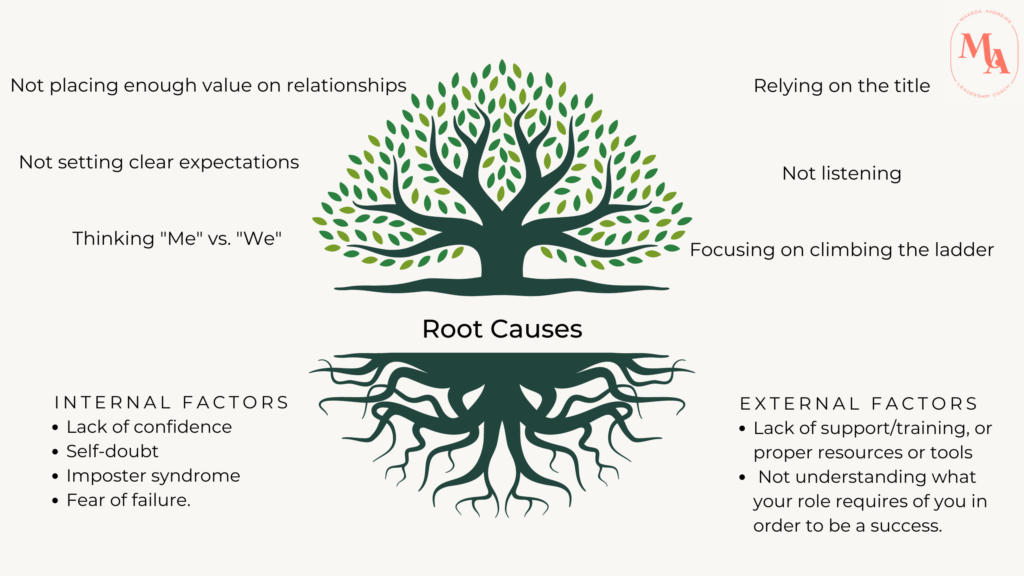WHY MANAGERS FAIL – 6 Reasons Many First-Time Managers Don’t Succeed
Hi, I'm Mak. I'm a leadership coach for new managers who knows what it's like to be filled with overwhelm, self-doubt and terror that I’d let everyone down. My Story
FREE MICROCAST
How to Become an Effective Leader so You Can Build a High Performance Team
Learn how to delegate with confidence, navigate those tricky conversations (even for introverts!), and finally stop relying on Google to do your job.
Netflix < MakTV
THE YOUTUBE CHANNEL
No but really. This is the kinda content that’s actually healthy to binge. In fact, you become more of an awesomesauce manager with every video you watch.
Updated – May 26th, 2023
Being a first-time manager is a challenging task. It requires you to develop or strengthen your skill set, have a deep understanding of human relationships, and have the ability to juggle multiple responsibilities. But, despite many people checking all the boxes, they still fail in their roles as first-time managers. In this blog post, we’re addressing some of the leading causes of why managers fail, and I’ll share how you can counteract certain situations to your favor, so keep on reading!

Scary statistics for first-time managers.
It’s no secret that first-time managers fail rapidly; Gartner, an IT and research consulting company, just released another study that found 60% of new managers fail within their first two years. I remember when I first stepped into the role years back, seeing a similar study at about 53%. But I’m not surprised this rate has gone up. Many new managers’ challenges are still not addressed in the workplace. But here’s another kicker. The speed at which new managers fail expects to move even higher due to COVID. Mainly because many new managers are trying to figure things out, learn and adjust remotely and under constantly changing circumstances.
Reading that made me sad.
But, as you all know, I’m on a mission to get that number down as much as possible. I want you to be part of the batch that makes it and gets an opportunity to grow in your career, develop your leadership skills, make an impact, influence your team, and so much more.
But before focusing on the solution, let’s highlight some problems. Here are the six reasons why managers fail in their new roles and find out if you can relate to one of these.
Number 1 – Thinking me vs. we
When I get on a call with applicants for my coaching program, I often notice that they usually start by talking about their achievements and how great they are. Don’t get me wrong, I applaud their confidence, but if you want to succeed as a manager, your focus needs to change.
Let me explain.
When you prioritize your personal success over team achievements, people may not feel valued or motivated. So instead, focus on building a work environment of collaboration. Doing so will allow you to have a highly motivated and productive team.
Number 2 – Not setting clear expectations
Not setting clear expectations from the beginning is a recipe for disaster and is why many first-time managers fail in the first place. Instead, try to take the right path, communicate the expectations to team members, and establish their goals and responsibilities. Doing so will provide clarity to every member of your team, minimize misunderstandings or assumptions and boost productivity.
Try also to do regular check-ins and promote open communication channels with the people in your team to ensure everyone is on the same page.

Number 3 – Not placing enough value on relationships
I talk to many new managers who start looking to drive results without having stopped to understand their team. Unfortunately, trying to drive results from a group of people you do not know has some highly detrimental effects.
Successful managers invest time in getting to know their team members and understanding their strengths and improvement opportunities through leadership tools like regular one-on-one meetings or constructive feedback. Also, recognizing their contributions can significantly change the team dynamics and overall performance. Try these tips to establish priority in your relationship, and you will get amazing results.
Number 4 – Relying on the title
Relying on the power from the title will only get you so far. This alone won’t guarantee you respect and influence. If you wish to have an integrated team, try to use other techniques like leading by example, having a welcoming attitude, and showing interest in the day-to-day operations.
If you’re in this pickle and don’t know how to get out, check out the New Manager Accelerator Program, our signature coaching program for first-time managers.
Number 5 – Not Listening
We have two ears and one mouth because we need to listen more than we speak. One of the most common reasons managers fail is because we don’t listen. Managers who don’t listen to their team or colleagues miss out on valuable information.
Try this; next time you address someone in your team, promote a safe space for open communication. Create trust through open dialogue, asking for honest feedback, and getting to know each person individually so you and your team are on the same page.

Number 6 – Focusing on climbing the ladder
I had a call with someone the other day who just became a manager, and she was already asking me how she could jump into senior management.
While having goals and ambitions are great, and I encourage you to grow constantly, focusing on the next before you’re even ready will hamper you from doing well in the present.
Your goal as a first-time manager is to focus on your current role and how you can be the best leader for your team. When you do this, it will help you to concentrate on one-day-at-a-time tasks while setting goals for the future. Try to focus on supporting your team, learn from them, and grow from experiences while you work on developing your skills and making the best at your current job; doing so will provide you with a better experience overall, and when a new opportunity arises you’ll know it will be the right time to take it.
How to address the root cause.
Now that we’ve talked about the six most common reasons managers fail, it’s time to talk about how these are merely consequences or effects of a cause. And, I hate to tell you, my dear manager friend, that we can’t cure the result without knowing what’s at the root.

As the graphic above shows, two main factors impact managers’ failure. Internal factors refer to those under your control. While external factors depend on someone else, your authority and power are reduced to specific actions. Identifying the root cause to work on its effects is identified.
The big question is what to do. How do we fix this? Well, in my experience, the following tactics work well:
Get yourself a mentor.
Choose to lean on a person or even a group of experts in the management field, so they can help you identify some of the disempowering thoughts you’re having and, practically speaking, help you navigate one of the most challenging transitions of your career.
Start asking questions and then actively listen to what people say.
Instead of being the person with all the answers, strive to be the person who asks the best questions.
I’ve said it before on my channel, one of the best illustrations I’ve heard is that questions are like scalpels – they allow you to get under the surface.
When you improve your skillset of asking good questions, you improve your ability to make better decisions.
Ask for what you need.
To do well, you need resources, tools, and training. But, just like we would only expect a doctor to perform surgery with the proper knowledge, everyone else must expect the same from you.
Most companies have stipends or an education budget for development. Use it to train yourself instead of trying to figure it out alone.
Here’s the truth: you might not have that luxury of time to try and DIY. That’s one reason so many managers fail – they run out of time before “figuring it out.”
In coaching sessions with clients, it often comes up that they do not want their manager to know that they do not know what they are doing and need some support. But the truth is that they already know you don’t know what you’re doing. You’re brand new. If you just pretend you know exactly what you are doing, it eventually costs the company more money. The longer it takes you to get spun up, the more mistakes you make, ultimately affecting their bottom line.
So there is no shame in saying you need training.
Besides, nothing says to senior leadership they made the right choice better than a manager taking the initiative to get the support they need.

Ask for help when needed.
There is no need to try and do it all on your own. This was probably my biggest error.
I got overwhelmed and burnt out quickly trying to do things on my own, which was a HUGE mistake.

Harness the power of delegation by empowering your team members to do what they are good at. You have a lot of people on the team that you can empower through delegation.
I hope this article has enlightened you to start trying something new and making a new mark in your managerial career. If you need extra help dealing with these challenging situations, check out our New Manager Accelerator Program and see if the time is right for you. Don’t forget to let your comment below and share this post with your family and friends.

September 8, 2020